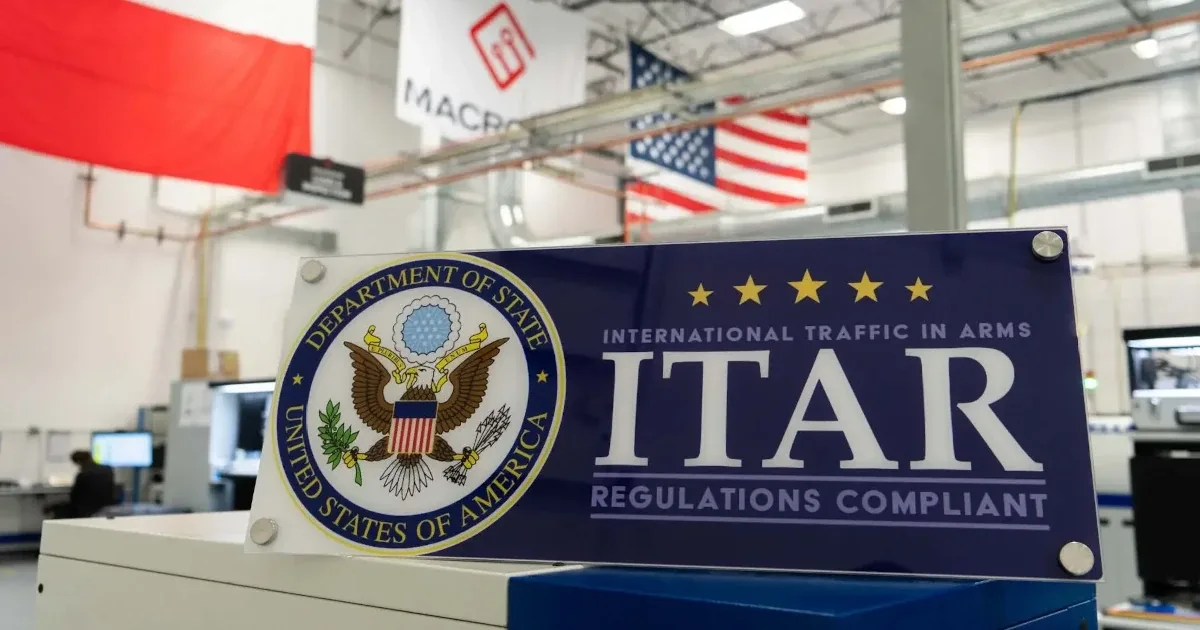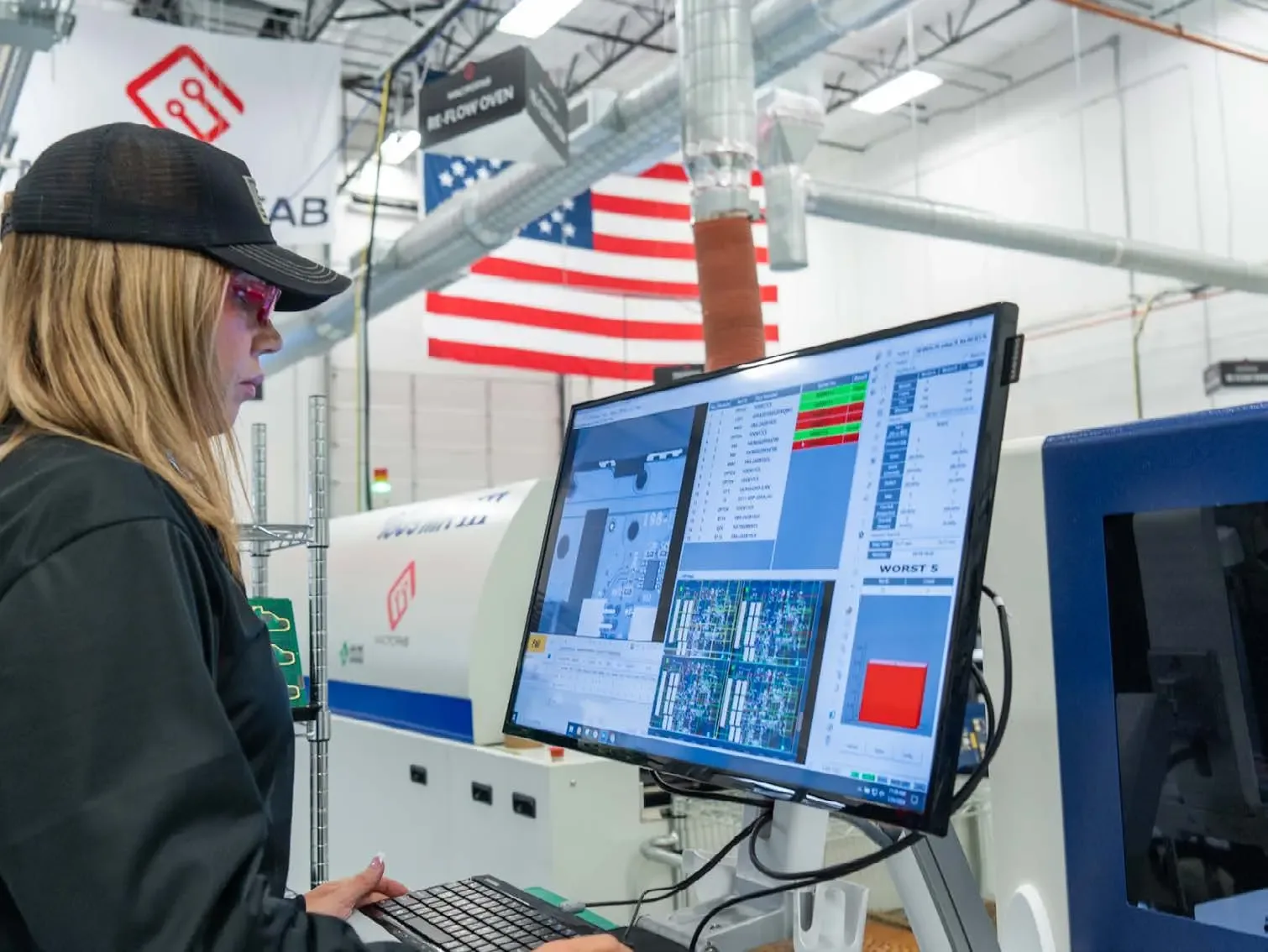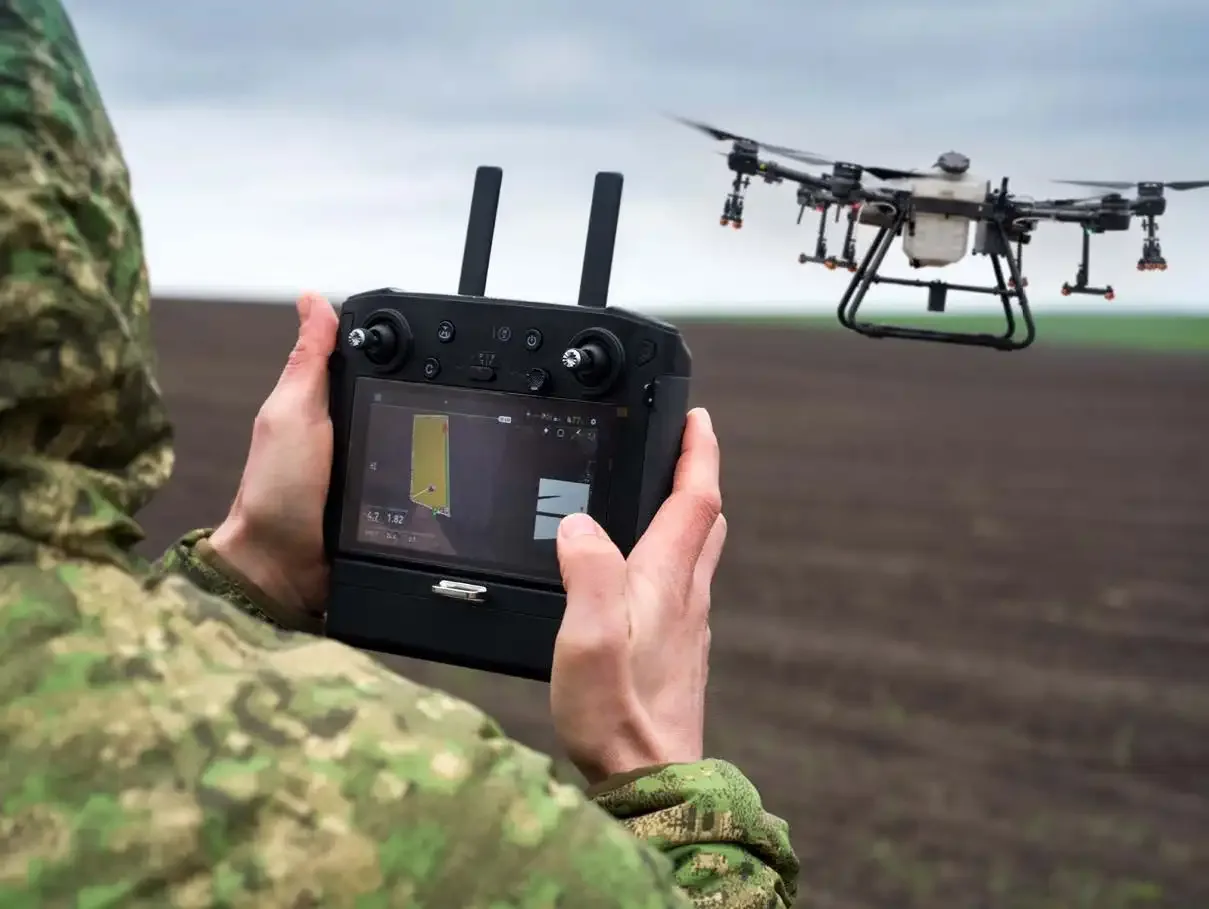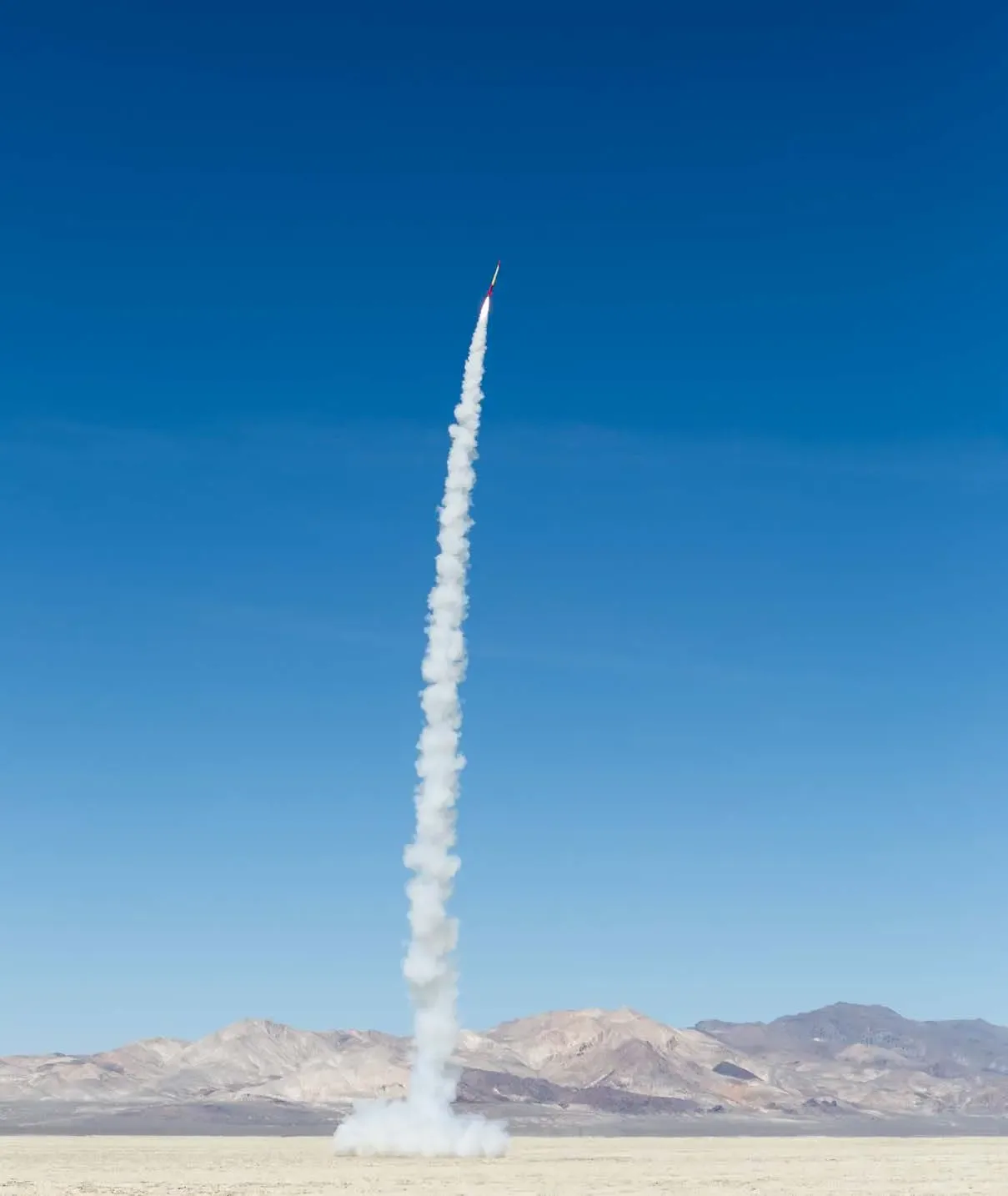
MacroFab Blog
The International Traffic in Arms Regulations (ITAR), detailed within 22 CFR parts 120-130, plays a crucial role in electronics manufacturing, with a special focus on defense-related endeavors. This regulatory suite oversees the manufacturing, export, and import of defense-specific articles and services, as outlined in the United States Munitions List (USML).
ITAR compliance is a critical measure protecting essential technologies and services vital to the security of our nation. This framework seeks to prevent the transfer of proprietary technologies to those who might use them against U.S. interests and to keep American businesses from unknowingly supporting foreign competitors.
In essence, International Traffic and Arms compliance plays a dual role: it safeguards our technological edge, as well as prevents others from unintentionally gaining an advantage thanks to our innovations. It's a shared responsibility among those of us in the industry to both comprehend and comply with ITAR, as this not only protects our work but also contributes to our collective security.
Exploring ITAR: A Deeper Look
ITAR regulations were implemented by the United States government to control the export and import of defense-related articles and services. The scope of ITAR is expansive, covering a wide range of items listed under the USML. This includes, but is not limited to military and space electronics, navigation and avionics equipment, and defense-related software and technology.
USML categorizes various defense articles and services subject to ITAR's authority that are deemed critical for national security and therefore subject to export control restrictions. Because of their significance, export controls are placed on these items so they stay in the right hands. It's a meticulous system, but it's all about protecting what's important to us on a larger scale, making sure our innovations make a positive impact on safety rather than creating dangers.
ITAR Compliance: Requirements and Procedures
The road to ITAR compliance is paved with several key steps. First, organizations need to take a good look at their activities. Are they working with anything that might fall under ITAR's umbrella? This initial assessment is crucial, as it will determine the next steps. If ITAR applies, then some items will need to be classified as controlled. Once that's done, obtaining the necessary licenses for export or import becomes essential.

But ITAR compliance goes beyond licenses and classifications. It's also about keeping things secure. Organizations need to establish strong security measures to protect ITAR-controlled information and items. And let's not forget the people. Comprehensive training for employees makes sure everyone on the team understands their role in upholding ITAR regulations.
The journey doesn't end there. ITAR is a living document, and its regulations can change frequently. Organizations must stay informed about these updates, just like refreshing a well-worn map. Regular internal audits and reviews act as checkpoints, making sure the organization is still on the right track.
Consider a company that has clear reporting protocols in place for potential ITAR violations. This proactive approach demonstrates a commitment to staying compliant. It's this constant vigilance and adaptation that reflects the dynamic nature of ITAR compliance. In this dynamic environment, organizations need to be agile and well-informed to remain competitive.
The Essence of ITAR Compliance
For organizations involved in manufacturing, selling, or distributing defense-related products and services, compliance with ITAR is a national security imperative. It shows that an organization takes export control laws seriously, making sure sensitive technologies are handled responsibly.
An organization's reputation in the defense industry depends on adhering to a strict ITAR compliance program. It demonstrates a commitment to ethical practices, fostering trust with government agencies and partners. This, in turn, sets a high bar for operational excellence within the industry. By following ITAR guidelines rigorously, organizations contribute to global security, paving the way for more collaboration and growth within the defense sector.
ITAR Compliance: Who Needs to Comply?

ITAR's reach extends to a broad spectrum of people and businesses in the U.S. involved with defense articles and services. Wholesalers, technology vendors, and even third-party suppliers – all fall under its umbrella if they manufacture, broker, or export these items.
For those who do, registration with the Directorate of Defense Trade Controls (DDTC) is a crucial first step. This registration unlocks the door to obtaining licenses, essential for any activities related to the USML (United States Munitions List).
Collaboration in the defense sector often involves foreign partners. ITAR compliance extends to these partnerships as well. U.S. entities can work together with these foreign persons by securing authorization for controlled information transfers and fostering a shared responsibility to prevent violations. This collaborative approach strengthens compliance throughout the supply chain.
ITAR Exemptions: Understanding the Exemptions
Part 126.4 of ITAR outlines the exemptions applicable to certain agencies of the U.S. Government and some sanctioned countries. These exemptions provide relief from the standard licensing requirements under specific circumstances.
ITAR Part 126.4 also discusses exceptions relating to international cooperation and agreements. If the U.S. enters into a defense agreement with an allied country or international organization, these exemptions apply.
For this reason, ITAR restrictions may be relaxed to allow the exchange of defense-related technical data and services. However, these exemptions must be thoroughly understood by entities involved in such agreements.
Identifying ITAR-Subject Items
ITAR's reach goes beyond the final product – that radar system or communication device you see. It also covers the parts, components, and technologies that make them tick. This comprehensive list extends to technical data, software, and even the services involved in designing, developing, producing, and using these defense articles. So, even a seemingly small component or a piece of technical information can be under ITAR's umbrella if it plays a vital role in how a defense article works.
ITAR-controlled electronics fall into several categories, including:
- Avionics, including flight control systems, navigation equipment, and radar systems used in military aircraft
- Military computers and servers designed to withstand harsh environments and meet specific classified security requirements
- Military communication devices, including secure radio systems, encryption equipment, and satellite communication systems
- UAVs, or military drones, and their navigation, communication, and targeting systems
- Electro-optical devices, including laser rangefinders, night vision equipment, and targeting systems
- Electronic warfare equipment, including jammers, receivers, and other devices used in electronic warfare
To navigate this landscape smoothly, organizations can carefully review the United States Munitions List (USML). This detailed list helps identify items and information that fall under ITAR control. Taking a meticulous approach to compliance is key. By carefully classifying what they handle, organizations can avoid significant legal and financial hurdles that might arise from accidentally mishandling ITAR-controlled items.
Learn more about Mil-Spec Standards in PCB Assemblies.
Checkpoint
The repercussions for ITAR violations can include civil fines or penalties up to $500,000 per infraction, criminal fines up to $1 million per offense, loss of export licenses, and significant business disruption.
ITAR Violations: Real-World Examples
Violations of ITAR come in many forms. Some examples include exporting controlled items without a license, dealing with sanctioned entities without authorization, or shipping to embargoed countries without approval.
These violations can have serious legal and financial repercussions. Companies have faced hefty fines and legal actions for unintentionally sharing technical data without proper authorization. Similarly, firms have been penalized for shipping ITAR-controlled hardware to unintended destinations. Consequences can include civil fines or penalties up to $500,000 per infraction, criminal fines up to $1 million per offense, loss of export licenses, and significant business disruption.
These real-world examples serve as valuable lessons. They emphasize the importance of strong internal controls and close monitoring of all export activities, and the need to take data security seriously. To stay compliant with ITAR regulations, organizations can implement robust compliance programs.
ITAR Registration for Companies
ITAR registration is the key for companies working with the US Munitions List (USML). It allows them to comply with ITAR regulations and legally participate in these activities.
While some might think ITAR certification is the same, registration with the Directorate of Defense Trade Controls (DDTC) is a separate but crucial step. Think of it as a handshake that officially recognizes a company's compliance efforts.
The registration process is ongoing. Companies renew it annually and submit updates on any business changes, keeping the DDTC informed. This shows a continued commitment to responsible global trade and national security. While it doesn't automatically grant export privileges, registration opens the door for companies to apply for the necessary licenses for ITAR-controlled items.
ITAR Compliance Strategies for Electronics Manufacturers
Smart compliance is key for electronics manufacturers working with ITAR. This means taking a proactive approach. Regular audits help identify any gaps in internal processes. Training employees on ITAR regulations empowers them to make informed decisions. Secure data management safeguards sensitive information. Adherence to export control laws and regulations keeps everyone on the right side of international trade.
Equally important are strict access controls. Setting clear rules about who can access ITAR-controlled items and information, and under what circumstances, protects sensitive data and products. Maintaining detailed records of all transactions and internal procedures related to ITAR-controlled items provides a clear audit trail for future reference. This meticulous approach streamlines compliance efforts and fosters a culture of security within the organization.
Technology and ITAR Compliance

Technology is a strong ally for ITAR compliance! Software solutions and automated systems like MacroFab’s connected technology platform can make the process smoother and less error-prone. Imagine streamlining tasks and minimizing mistakes.
Think about using cutting-edge tools like AI and blockchain to boost security and traceability. AI algorithms can analyze vast amounts of transactions and communications, flagging potential ITAR issues. Meanwhile, blockchain technology can track the lifecycle of ITAR-controlled items.
These advancements bring greater transparency and accountability to the supply chain. They help catch potential problems early on, reducing the risk of unintentional violations. This translates to a more secure and efficient compliance process for everyone involved.
Training and Awareness: Key to ITAR Compliance
Employees are the heart of ITAR compliance. A well-informed team is key to success. Companies can achieve this by investing in comprehensive training programs. These programs should explain ITAR regulations and their impact on daily tasks.
Keeping everyone up-to-date is just as important. Regular updates and refresher training sessions guarantee the workforce stays current on any changes in ITAR regulations. Don't limit this training to just the compliance team! Everyone involved in the manufacturing, handling, and distribution of ITAR-controlled items should be included.
By creating a culture of compliance and awareness, organizations can empower their employees. This proactive approach significantly reduces the risk of accidental violations and strengthens the company's overall compliance posture.

Future of ITAR in Electronics Manufacturing
The future of ITAR in electronics manufacturing is likely to see continued emphasis on compliance, with potential regulatory changes and technological advancements shaping the landscape.
In the coming years, ITAR in electronics manufacturing may integrate more advanced compliance verification tools, like real-time monitoring systems and AI-driven analytics. These technologies could make pre-emptive identification of potential issues, smoother international collaboration vetting, and overall efficiency gains a reality.
To navigate these changes, staying agile and adaptable is key. Companies that can adjust their compliance strategies as the global landscape evolves will be well-positioned for success.
Conclusion
ITAR plays a vital role in electronics manufacturing, especially for defense-related products. It's a cornerstone of national security, providing responsible export and import controls. Beyond following the law, ITAR compliance demonstrates a company's commitment to ethical and responsible business practices on the global stage. By embracing innovation and staying adaptable, manufacturers can navigate the future of ITAR with confidence.
FAQs
What is the meaning of ITAR?
The ITAR is a set of regulations, found in sections 120-130 of Title 22 of the Code of Federal Regulations (CFR), that govern the responsible management of defense-related technologies. It applies to the manufacturing, export, and temporary import of defense articles, services, and brokering activities. The US Munitions List (USML), listed under ITAR section 121.1, details the specific items covered by these regulations.
What is required to be ITAR compliant?
Organizations that deal with defense-related articles and services need to be ITAR-compliant. This means they take control of exports and imports, classify controlled items, and obtain necessary licenses. It also involves implementing strong security measures, providing comprehensive training for employees, and staying up-to-date on any changes to ITAR regulations through regular monitoring.
What does being ITAR Compliant mean?
For organizations involved in the sale, manufacture, and distribution of defense-related products and services, ITAR compliance signifies adherence to a strict set of rules. These regulations assure that all aspects of their operations, from manufacturing to export, meet the specific standards outlined by ITAR.
Who is subject to ITAR?
ITAR applies to US persons and entities involved in the manufacturing, brokering, or export of defense articles and services. Even if they don't directly export USML-controlled items, registration with the Directorate of Defense Trade Controls (DDTC) is still required.
Who is exempt from ITAR?
Certain U.S. Government (USG) agencies and some sanctioned countries may be exempt from ITAR according to Part 126. For instance, a department, agency, or person of the US Government might not need an export or import license for defense-related items or services.
What items are subject to ITAR?
ITAR controls a wide range of items, going beyond just finished products like radar and communication systems. It also includes components, parts, and technologies that are essential to these systems. This comprehensive list covers a broad spectrum of military and defense-related equipment and data.
What is an example of ITAR Violation
Examples of ITAR violations include exporting controlled items without the necessary government license, conducting unauthorized transactions with sanctioned entities, or exporting goods and services to embargoed countries without federal approval. These violations can result in significant legal and financial repercussions.
What is an ITAR-registered company?
A company registered with the Directorate of Defense Trade Controls (DDTC) that manufactures, distributes, or exports defense articles or technical data under the USML is considered an ITAR Registered Company. Registration is a necessary step to obtain licenses and demonstrates the company's commitment to upholding national security regulations through ITAR compliance.
Is ITAR Certified the same as registered?
"ITAR Certified" often refers to a company's efforts to follow ITAR regulations, while "ITAR Registered" specifically indicates formal registration with the DDTC. Registration is a mandatory step for companies to be acknowledged as compliant and eligible for licenses related to the USML.
What is ITAR manufacturing
ITAR manufacturing is the production of defense products, services, or related technical data that fall under ITAR regulations. It involves strict adherence to ITAR guidelines to ensure these sensitive items are manufactured, transferred, and handled in a way that safeguards national security interests.
Related Topics
Electronics in Motion: How Innovations are Redefining E-bike Experiences
This article explores how electronics and PCBAs contribute to the success of e-bikes today.
How MacroFab Uses Clear Communication to Improve Your PCB Production Experience
This blog will discuss how MacroFab can help customers in their PCB production experience through clear communication in a high-octane environment.
ITAR in PCBA Production: Insights You Might Be Missing
ITAR regulates a wide range of sensitive technologies, from primary military equipment to gas turbines, electronics, and personal protective gear.
Ready to build your ITAR-compliant PCBA?
Get an instant quote nowAbout MacroFab
MacroFab offers comprehensive manufacturing solutions, from your smallest prototyping orders to your largest production needs. Our factory network locations are strategically located across North America, ensuring that we have the flexibility to provide capacity when and where you need it most.
Experience the future of EMS manufacturing with our state-of-the-art technology platform and cutting-edge digital supply chain solutions. At MacroFab, we ensure that your electronics are produced faster, more efficiently, and with fewer logistic problems than ever before.
Take advantage of AI-enabled sourcing opportunities and employ expert teams who are connected through a user-friendly technology platform. Discover how streamlined electronics manufacturing can benefit your business by contacting us today.